From July 10 to 12, 2024, the Academic seminar "International Relations and Regional Governance under the Accelerated Evolution of a Century of Change" was successfully held in Lanzhou University. This conference is the second conference of the series of academic seminars on "The Accelerated Evolution of Centennial Change and its Response". It is co-sponsored by School of International Relations, University of International Business and Economics, School of Politics and International Relations, Central China Normal University, School of International Relations/Institute of Overseas Chinese, Jinan University, School of Politics and International Relations, Lanzhou University, School of Politics and International Relations, Tongji University (in Alphabetical order), and co-hosted by School of Politics and International Relations, Lanzhou University, and Institute of Central Asian Studies. Co-organized by School of International Relations, University of International Business and Economics. More than 30 experts and scholars from the above five universities, Northwest Normal University, Tianjin Academy of Social Sciences, Shanghai Modern Management Research Center, Zhengzhou Police College, Jiji Press and other universities, research institutions and publishing units gathered at the bank of the Yellow River to exchange academic views on major issues such as the evolution of international relations under the 100-year change, major changes in the international pattern and regional governance. Collision of academic ideas, sharing academic feast. The opening ceremony was presided over by Gao Wani, deputy dean of the School of Politics and International Relations of Lanzhou University.
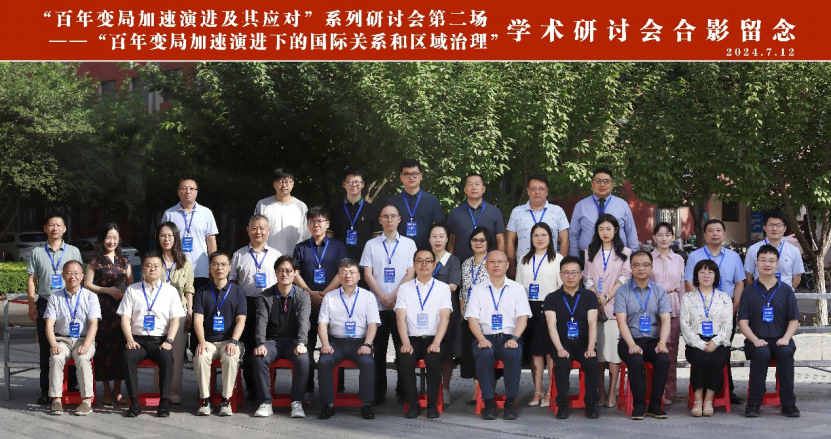
Zhu Yongbiao, Dean of the School of Politics and International Relations of Lanzhou University, welcomed and thanked the experts attending the meeting on behalf of the School. He introduced the history of the establishment of the School of Politics and International Relations of Lanzhou University and the Institute of Central Asian Studies as well as the basic situation of the school at present, and pointed out that the characteristics of great changes in today's world are becoming more and more obvious, and geopolitical shocks are unprecedented. Traditional elitist groups and audience groups have a big split, anti-intellectualism is in the ascendancy, artificial intelligence has entered a new stage of rapid development, these factors have created challenges and opportunities for the international political system. He called on experts to share their wisdom and contribute to the construction of the academic community.
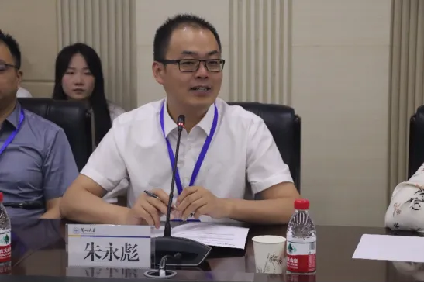
At the conference, Ju Hailong, Dean of the School of International Relations and Research Institute of Overseas Chinese at Jinan University; Hu Zongshan, Dean of the School of Politics and International Relations at Central China Normal University; Zhong Zhenming, vice Dean of the School of Politics and International Relations at Tongji University; Zhao Yang, Professor of the School of International Relations at the University of International Business and Economics; Zeng Xianghong, Professor of the School of Politics and International Relations of Lanzhou University and Director of the Shanghai Cooperation Organization Research Center, and Zhang Weibin, deputy director of the National Risk Research Center of the National School of Open Studies of the University of International Business and Economics delivered keynote speeches in turn.
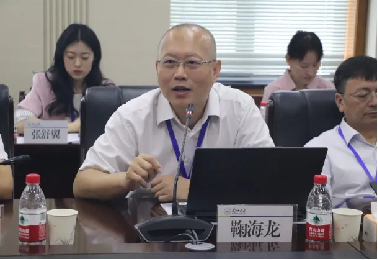
Starting from the international discourse on the South China Sea policy of the Philippines, Professor Ju Hailong introduced the big data analysis system of international public opinion on security around the South China Sea that he and his research team had done. He made a statistical analysis of the issues of the international and Philippine mainstream media on the South China Sea issue, and took the South China Sea arbitration case of the Philippines as an example to demonstrate the "weak narrative" strategy adopted by the Philippines to bully China's discourse on the South China Sea issue. This provides powerful evidence and a new perspective for our country to fight for the right of discourse in the South China Sea issue.
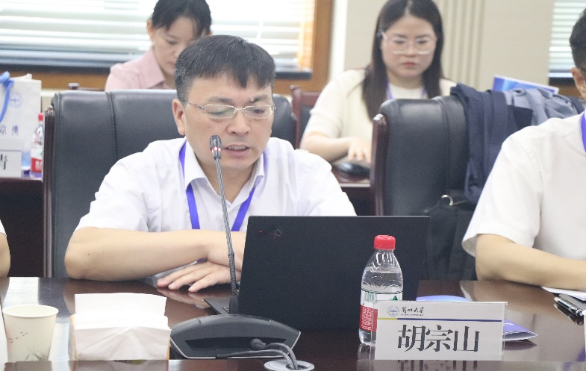
Professor Hu Zongshan gave a speech entitled "New International Changes and New Philosophy of Great Power Competition". He believes that the current world pattern is evolving from "great changes" to "new changes", and the philosophy of contemporary great power competition is the explicit competition and implicit competition based on national strength competition. The competition between China and the United States involves the choice of national path, whether to choose self-reliance or dependence on the West. To maintain unity or to promote separation? Do you choose a uniform advanced mode or keep your own characteristics? Should we choose universal values or insist on cultural diversity? Under the overall national security concept, the competition between China and the United States shows the characteristics of non-warfare competition bottom line and controllable competition cost.
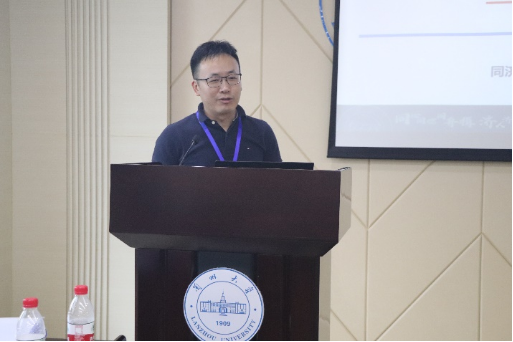
Based on the structural power perspective, Professor Zhong Zhenming analyzes the behavioral logic of the security of the American international economic system. He believes that the policy behavior of the United States to secure the international economic system reflects its pursuit of structural power, which is an important manifestation of its security generalization under the need to maintain hegemony. The security of the US international economic system is manifested in trade, finance, knowledge and other aspects, which leads to the expansion of the global governance deficit and trust deficit, and aggravates the anti-globalization.
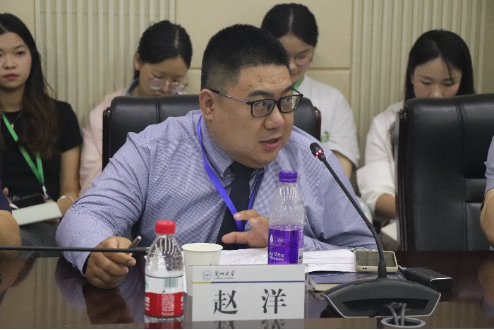
With the title of "The Belt and Road" and the Construction of a developing-oriented International community ", Professor Zhao Yang reviewed the existing norms and major existing problems of the international community, proposed to promote the rules and norms of the international community to meet the interests of member states, and bring the development norms of the Belt and Road Initiative, which are negotiated, co-built and shared by the Communist Party of China, into the construction of the international community. Make up for the shortcomings of the existing international community and ease the global trust deficit.
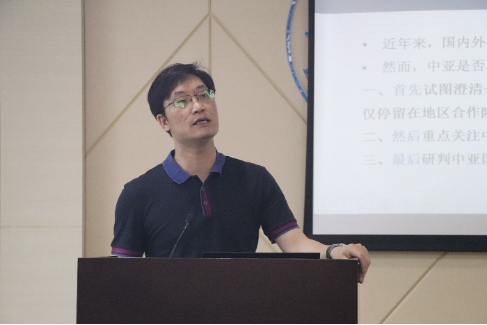
With the title of "Central Asia Regional Cooperation and its Impact on Regional Order", Professor Zeng Xianghong pointed out that the proposition of "Central Asia regional integration/autonomy" is "advanced", Central Asia is still in the stage of regional cooperation, and the power transfer of the five Central Asian countries, the change of the attitude of the United States and Russia toward Central Asia, and the expansion of the SCO membership have promoted the regional cooperation in Central Asia to show a new positive trend. To a certain extent, it will promote the change of Central Asian integration and Central Asian autonomy, and then affect the future of Central Asian regional order.
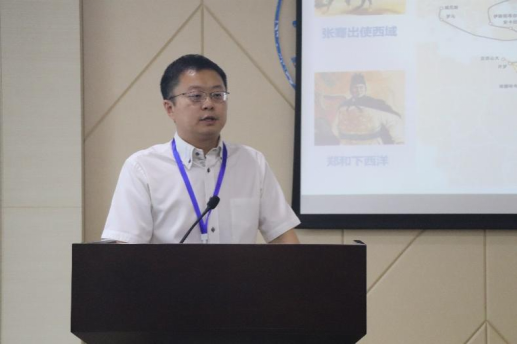
Professor Zhang Weibin analyzed the impact of artificial intelligence technology on geo-development and put forward suggestions to deal with it. He believes that today's world is in a high-speed flow of information, which will exacerbate regional conflicts. Artificial intelligence technology can help researchers obtain global data and improve research efficiency, form favorable advantages and new quality productivity for our country, and provide data support, intellectual support and method support for peaceful development between geographies. After the keynote speech, the participating experts and scholars expressed their opinions on five topics, including "the cycle of the evolution of international relations", "Relations between major countries under Great changes", "the current international pattern and major issues", "the impact of international changes on regional governance" and "international and neighboring hot issues", and put forward many views with theoretical value and practical significance. Chen Xiaoding, Deputy Dean of the School of Politics and International Relations of Lanzhou University, Wang Yonghui, Professor of the School of Politics and International Relations of Central China Normal University, Wang Chuanxing, Professor of the School of Politics and International Relations of Tongji University, Liu Mingzhou, Professor of the School of Politics and International Relations of Central China Normal University, and Cheng Xiaoyong, Deputy Secretary of the Party Committee of the School of International Relations of Jinan University, presided over the sub-topic discussion respectively. Young students from all over the country participating in the summer camp of Lanzhou University participated in the discussion.
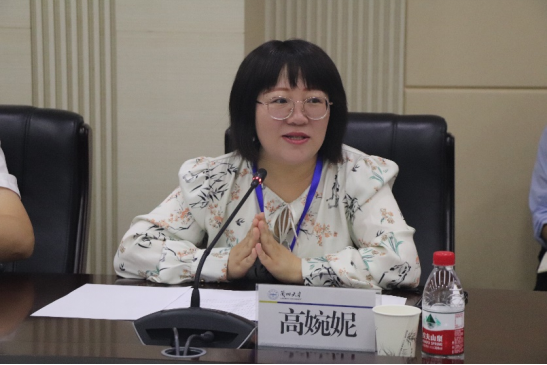
At the closing ceremony, Gao Wani made a concluding speech. She affirmed the academic quality of this conference, pointing out that this seminar reflects the characteristics of "east-west connection", "North-South connection" and "convergence center", whether from the geographical and political attributes of the research topics or the source distribution of the participants. The breadth and depth of the research of the participants are increasingly concerned with our practical interests, which is the mission of the experts and scholars of international relations and regional studies given by China's development stage under the great changes, and how to balance academic research and policy research is a common problem we face. She once again thanked Youalumni Institute for its support and help, and hoped that in addition to academic exchanges, there would be more cooperation in personnel training and discipline construction in the future.
